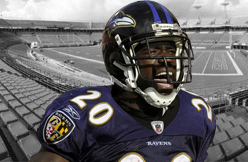NEW ORLEANS — Super Bowl experience comes in all shapes and sizes, but no player in Sunday's game will be able to match that of the Baltimore Ravens' Ed Reed.
Not only has Reed already played on Super Bowl Sunday, but he has also done it on this very Superdome turf.
OK, so it was in an NFL Punt, Pass and Kick contest before the Green Bay Packers-New England Patriots game in 1997, and he was 18, but who's counting?
"It was awesome," said Reed, who is from St. Rose, La., about 30 miles west of New Orleans. "I remember everything, really. Going against [eventual NFL journeyman quarterback] Craig Nall and guys like that, guys who played in the league. I was going against quarterbacks. I was a safety/quarterback athlete. I wound up winning the event, and the winner of the event came to media day to see guys just interact with you [reporters].
"I was just standing around, me and my dad. I remember seeing the Superdome field, I remember seeing you guys crowd around guys like this. It was just an awesome day."
The stakes will be much higher when Reed's Ravens play the San Francisco 49ers in Super Bowl XLVII, and safety Reed is the linchpin of Baltimore's defense.
Since entering the NFL in 2002, Reed has had more interceptions (61) and return yards (1,541) than any other player in football.
Reed has scored 13 touchdowns in his career, including the postseason, and he's the only player in league history to score return touchdowns off a punt return, blocked punt, interception and fumble recovery.
Ravens Coach John Harbaugh referred to Reed as a "staple" and "fixture" on the team, and in Baltimore in general.
"He's a mentor for our players, particularly the players in the back in the defense, but really our whole football team," Harbaugh said. "He's a spiritual leader, he's an emotional leader, and he's a big part of who we are."
The All-Pro Reed is also a controversial figure who was levied a one-game suspension this season — later lifted — for continuing his pattern of helmet-to-helmet hits.
He was fined $50,000 then $55,000 this season for striking defenseless players in the head or neck regions. As significant as those fines were, they amounted to about one-quarter of his weekly paycheck of $423,529.
Not surprisingly, Reed thinks that the NFL is too focused on offensive players and that the rules pendulum has swung too far in their direction. He raised eyebrows with his frankness this week when asked about Junior Seau, the former linebacker who committed suicide last spring and was later found to have a concussion-related brain disease.
"Did he sign up for it? Yeah, he signed up to play football…." Reed said Tuesday. "Junior gave everything he had to football. I'm sure he's looking down and has no regrets."
On Wednesday, he clarified his comment: "When I said I know he won't have any regrets, I was talking about football, not the fact that the man passed away and lost his family."
Reed is in an interesting spot, because he might be the greatest player in this Super Bowl — perhaps more dominant at his position than Ravens linebacker Ray Lewis and 49ers receiver Randy Moss have been at theirs — and yet the way he plays is precisely what the NFL is trying to change.
Asked whether he approves of the way the league is headed, issuing more and greater fines for helmet-to-helmet offenders, Reed said: "Honestly, there's a Catch-22 with that. You have to police the situation, but at the same time, you have to make sure you're doing the right thing for the players also. Not everybody is making the money that you're taking, and not every offense is deserving of $100,000, $50,000 fines.
"And these are players on that committee, [former safety and now NFL Vice President of Football Operations] Merton Hanks and guys like that, who have been in the game, but also have a boss to answer to. A lot needs to be done with it. I don't think every fine is right. You have to go back and really look at how guys play the game before you judge them, is what I'm trying to say."
Reed conceded he has some memory loss, but he's not sure whether that's attributed to football — he's had three concussions, by his count — or "sometimes I feel like I forget things, but who doesn't go through those things?"
Reed has led a privileged professional life, but also a rough one. He's 34, with patches of gray in his hair, and he has given thought to hanging up his cleats after this season, although he's not ready to make that call now.
"The truth is that football does take its toll," he said. "It does take its toll on our life and our body. So that's why physically, I was assessing myself through the years, and even now, to see how I feel. I've been doing some great things with my doctor, to kind of combat against the [aging] that we have. We age faster than everybody for what we do."
For him, though, Sunday will be frozen in time, just like that other Super Bowl Sunday was so many years ago.

(latimes.com)



